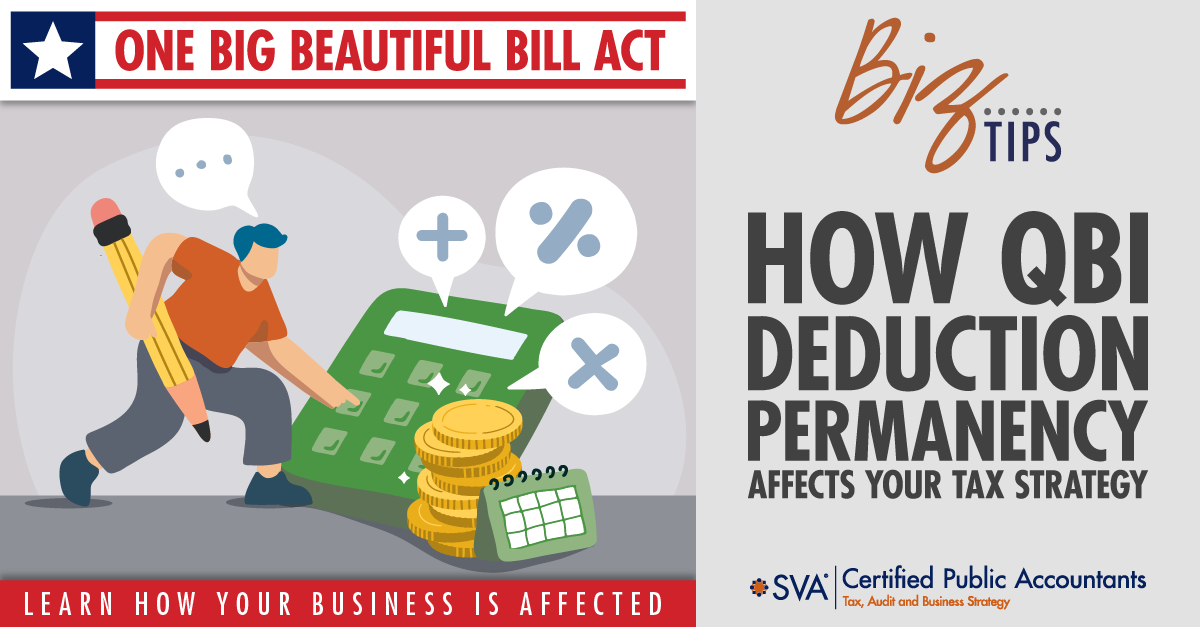| Highlights: |
- Explains the Qualified Business Income (QBI) deduction and how making it permanent under recent tax law changes removes its scheduled expiration after 2025.
- Describes why permanence matters for tax planning, offering owners of pass-through entities greater certainty in compensation, entity structure, and long-term strategy.
- Identifies key planning opportunities and considerations for business owners to adjust their tax strategy around the ongoing 20% deduction and eligibility rules.
|
One of the standout features of the One Big Beautiful Bill is the decision to make the Qualified Business Income (QBI) deduction permanent. For business owners who operate pass-through entities like S corporations, partnerships, or sole proprietorships, this is a big deal.
Originally created under the 2017 Tax Cuts and Jobs Act (TCJA), the QBI deduction was scheduled to sunset after 2025. But the new law removes that expiration date, giving business owners a valuable planning opportunity.
What is the QBI deduction, how does it work, and why does this permanent change matter? Read on to find out.
(Download Video Transcript)
What Is the QBI Deduction?
The QBI deduction allows eligible business owners to deduct up to 20% of their qualified business income, effectively reducing the amount of income subject to tax. It applies to income earned from certain U.S.-based businesses that pass through their income to the owner's personal tax return.
That includes:
It is important to note that this deduction does not apply to C corporations, since those are taxed at the corporate level.
For example, if your pass-through business earns $150,000 in qualified business income, you could potentially take a $30,000 deduction. That means you'd only be taxed on $120,000 instead of the full $150,000. This reduction can impact tax liability in a big way.
How the QBI Deduction Works
Let’s say you own an S corporation and your business brings in $200,000 in net income. As an owner-employee, you’re required by the IRS to pay yourself a reasonable salary. Assume that salary is $120,000. That wage income is taxed normally and includes payroll taxes.
The remaining $80,000 flows through as a distribution. It’s still subject to income tax, but not payroll tax. This is where the QBI deduction kicks in: you could deduct 20% of that $80,000, or $16,000. Now, instead of being taxed on the full $80,000, you’re taxed on just $64,000. That’s a significant savings.
What is a "Reasonable" Salary?
This is one of the more subjective (and frequently audited) areas of tax planning for S corporation owners.
A reasonable salary is based on:
- The role you play in the business
- How much time you dedicate
- Compensation benchmarks for similar roles
- A company's size and industry
For example, if you’re the only employee and you work full-time managing operations, handling sales, and doing client work, your salary should reflect the fair market value of that full-time effort. If you only work part-time, you may be able to scale that salary down accordingly.
Paying yourself too little can trigger red flags with the IRS. On the other hand, overpaying yourself limits the income available for QBI deductions and increases payroll tax liability. It’s all about finding a balance.
Why This Permanent Change Matters
Before this update, the QBI deduction was on a countdown clock set to expire after 2025. That made long-term tax planning tricky, especially for growing businesses deciding how to structure compensation, reinvest profits, or expand ownership.
With the expiration date removed, the deduction becomes a reliable tool business owners can use year after year. That opens the door for:
- More strategic compensation planning
- Long-term entity structure decisions
- Improved cash flow from lower tax burdens
- Reinvestment in business growth
It also levels the playing field between wage earners and business owners. Wages are typically taxed at higher rates and are subject to payroll taxes. By comparison, QBI-eligible business income gets a bit of a tax break, although not without its rules and limitations.
(Download Video Transcript)
Who May Not Qualify (or May Be Limited)
While many business owners qualify for the full 20% deduction, there are exceptions. Certain types of businesses may face limitations if their income exceeds certain thresholds. These are often referred to as Specified Service Trades or Businesses (SSTBs).
These include:
| Attorneys |
Physicians |
Accountants |
| Consultants |
Financial Advisors |
Performing artists |
| |
Athletes |
|
For these professionals, the deduction starts phasing out once taxable income exceeds a certain amount (which is adjusted annually for inflation). Once you go over the threshold, you may lose the deduction entirely.
The Bottom Line on the QBI Deduction
The QBI deduction is an impactful tax benefit available to owners of pass-through businesses. Making it permanent provides the stability needed to make smarter financial decisions today and in the future.
Here’s what you can do now:
- Revisit your business structure to see if you’re set up to take advantage of QBI.
- Review your compensation strategy to see if there’s room for more tax-efficient distributions.
- Work with your advisor to project long-term tax savings under the new rules.
The QBI deduction may not apply to everyone in the same way, but for many, it’s a good way to reduce taxable income. With permanence now in place, it’s worth a second look.
© 2025 SVA Certified Public Accountants

